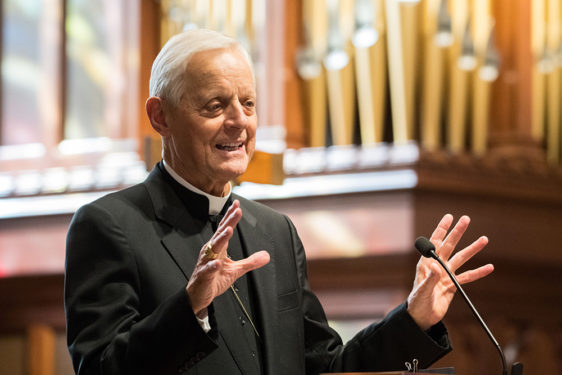
By Christopher White
The Tablet National Correspondent
In his opening lecture for Georgetown University’s Sacred Lecture Series, Cardinal Donald Wuerl of Washington offered a strong defense of Amoris Laetitia and Pope Francis’s efforts to decentralize Church governance.
Drawing on his participation in the 2014 and 2015 synods, which focused on family life, Cardinal Wuerl described them as “the most open, engaging and reflective of episcopal collaboration and consultation” of the 11 in which he’s been a participant.
The Cardinal’s lecture was organized around four pillars in which he believes Francis has offered the Church fresh perspectives: listening, accompanying, discerning, and evangelizing.
His remarks were delivered on Tuesday, just two days before Francis addressed newly-appointed bishops in Rome in which he said discernment is an “antidote against rigidity, because the same solutions aren’t valid everywhere.”
In defending Francis’s efforts to invite the participation of the world’s bishops in Church governance, Cardinal Wuerl said the Holy Father was following in the example of his predecessor Pope John Paul II.
“Saint John Paul II is perhaps the pope that more than any other has underlined the connection between the Synods of Bishops and episcopal collegiality,” said Cardinal Wuerl.
The 2014 and 2015 synods were called by Francis to invite an open discussion within the Church on the challenges of family life in the contemporary world.
“It was clear that the overwhelming majority of bishops shared the Holy Father’s vision that there has to be a way to present the Church’s teaching new in ardor, method and expression rather than simply come together to repeat and restate what is already known,” said the Cardinal.
In addition to the participation of cardinals and bishops, the synod brought together families from around the globe to participate and offer their diverse experiences of integrating family life with their faith.
According to Cardinal Wuerl, “Another very evident element in Francis’s understanding of synodality is the recognition that while the bishops are the official teachers and guardians of the faith, the faith is also expressed and voiced among all of the faithful.”
Among the many themes discussed, the question of communion for divorced and remarried Catholics took center stage. In April 2016, Pope Francis released Amoris Laetitia, his apostolic exhortation offering his final assessment on the synod deliberations.
The exhortation has come under much scrutiny from some quarters in the Church for its cautious opening for communion for divorced and remarried Catholics and placing greater emphasis on the role of pastoral discernment and accompaniment.
Drawing on the theme of mercy, which has been the touchstone of this papacy, Cardinal Wuerl said “the exhortation is calling us to a recognition that the starting point or principle from which our pastoral actions flow must be the revelation of God’s love and mercy.”
“Church law certainly has great importance but it is not the only point of reference in pastoral ministry,” he added.
Cardinal Wuerl, who has been one of the strongest apologists for Amoris Laetitia in the United States Church hierarchy, has repeatedly upheld the exhortation as a blueprint for improved pastoral ministry.
He has downplayed controversies surrounding the document, saying it’s “not a very large group,” and it’s “a rather concentrated, and in a certain sense, esoteric” discussion.
In his remarks to nearly 200 attendees, including Georgetown’s President Dr. John J. DeGioia, Cardinal Wuerl argued that by a renewed pastoral focus on listening to the real life experiences of the faithful, the Church as a whole could develop a deeper understanding of its doctrine.
“The Church’s pastoral mission and ministry must include not only the presentation of Church teaching (her doctrine), but also take into consideration how that teaching can be and is actually received or grasped by individuals, particularly given their situation and circumstances, and also how pastors of souls can engage in the company of the faithful in the journey towards embracing more fully the Church’s life-giving message,” said Cardinal Wuerl.
“What Pope Francis is doing is helping us all understand that to be true witnesses to Jesus we have to walk together in witnessing and supporting one another,” he concluded.
